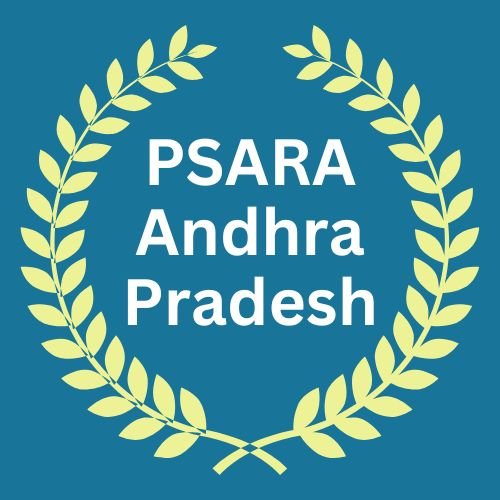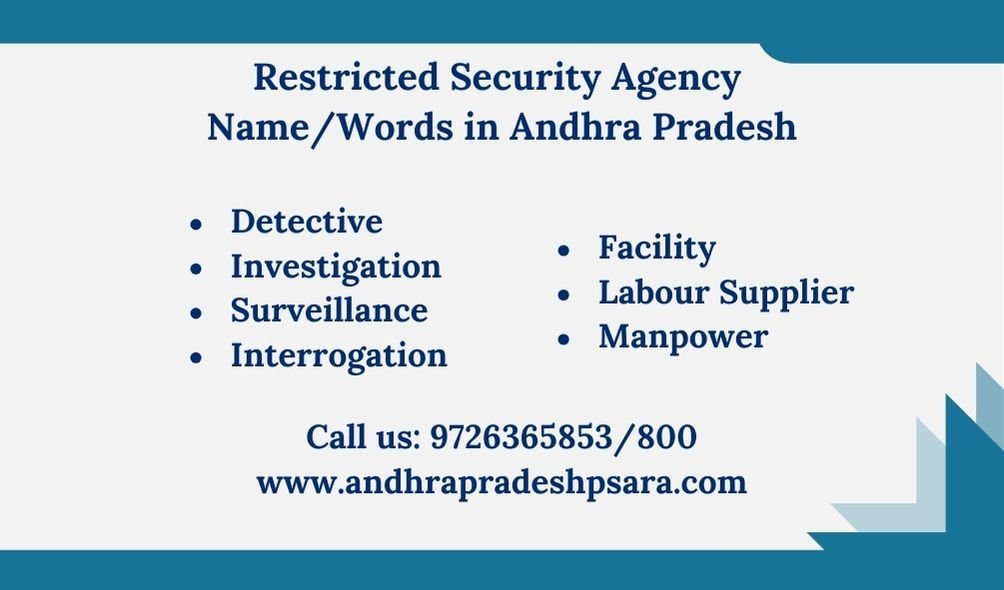Restriction of Words in Security Agency Business in Andhra Pradesh
In Andhra Pradesh, the Private Security Agencies (Regulation) Act, 2005 (PSARA) strictly regulates the use of certain words in the business names of security agencies to prevent misrepresentation or confusion with government bodies. The Act prohibits terms such as “Police,” “Law Enforcement,” “Government,” “National,” or any other words that suggest an affiliation with military or public authorities. This ensures that private security agencies do not mislead the public into thinking they have any official connection to law enforcement or government entities.
The Controlling Authority, typically the District Police Chief, reviews and approves agency names to ensure compliance with these restrictions. Additionally, Andhra Pradesh may have state-specific guidelines that further refine these rules. Violating these naming restrictions can result in serious consequences, including fines, suspension, or even cancellation of the agency’s license.
The state government actively enforces these regulations to maintain transparency and public trust in the private security sector. By preventing misleading business names, the government ensures that private security agencies operate ethically and do not create confusion with law enforcement, maintaining the integrity and credibility of the sector.
Guidelines for Words Your Private Security Agency in Andhra Pradesh
Government Regulations on Trade Terms in Security Agency Business
Private Security Agencies (Regulation) Act, 2005 (PSARA) regulates trade terms to prevent misleading claims and ensure transparency in the private security sector. Terms like “Police,” “Army,” or “Government” are strictly prohibited unless explicitly authorized, as they may falsely imply an official affiliation with government or law enforcement agencies. Security agencies must obtain a valid PSARA license and adhere to the conditions set under the Act, ensuring that all trade terms used in advertising, marketing, and official communications accurately reflect their status as private security providers. Misrepresentation of services, such as implying law enforcement or investigative authority, is strictly forbidden. Additionally, while PSARA provides a nationwide framework, states like Andhra Pradesh and Kerala may impose further restrictions on trade terminology and business operations. The agency name must be approved by the Controlling Authority, typically the District Police Chief, to ensure compliance with PSARA guidelines. Failure to comply with these regulations can result in fines, suspension, or license cancellation, with enforcement handled by the relevant authorities. These restrictions help maintain clarity, prevent public confusion, and reinforce the distinction between private security agencies and official government bodies.
These Are the Restricted Words in Andhra Pradesh for Security Agencies
The Private Security Agencies (Regulation) Act, 2005 (PSARA) restricts certain words in security agency names and services to prevent misrepresentation and ensure compliance.
Prohibited Words and Reasons
- Detective & Investigation: Imply police or intelligence work, which private agencies cannot perform.
- Surveillance & Intelligence – Associated with covert monitoring and espionage, restricted to government bodies.
- Interrogation – Suggests legal authority to question suspects, which security agencies do not have.
- Facility – Linked to non-security services like housekeeping, causing licensing issues.
- Labor Suppliers – Implies manpower supply, requiring a separate license under labor laws.
Legal Consequences
- Use of restricted words can lead to PSARA license rejection, fines, suspension, or cancellation.
- Misrepresentation may result in legal action under national security laws.
Security agencies must ensure compliance to maintain credibility and lawful operations.
Types of Restricted Words for Security Agencies in Andhra Pradesh
In Andhra Pradesh, the government enforces strict regulations on the terminology used by private security agencies to ensure clarity, prevent misrepresentation, and avoid unauthorized affiliations. As per the Private Security Agencies (Regulation) Act (PSARA), 2005, the following types of words are restricted for use in the names of security agencies:
- Government-Related Terms:
- “Government,” “Govt.,” “State,” “National,” “Bureau”
- These terms suggest a connection to government entities and are prohibited to avoid misleading the public.
- Law Enforcement and Military Terms:
- “Police,” “Army,” “Military,” “Defence,” “Forces”
- Terms implying an affiliation with law enforcement or the military are banned to prevent confusion with official bodies.
- Public Authority Terms:
- “Corporation,” “Board,” “Authority”
- These terms are typically associated with statutory or public organizations and cannot be used by private agencies.
- National Identity Terms:
- “India,” “Bharat,” “Republic”
- To avoid implying that a private agency has a national identity, these words are restricted unless specifically authorized.
- Investigative and Surveillance Terms:
- “Detective,” “Investigation,” “Surveillance”
- These words suggest investigative or surveillance authority, which is reserved for law enforcement agencies.
- Interrogation Terms:
- “Interrogation”
- This term suggests the power to conduct formal interrogations, a power exclusive to law enforcement bodies.
- Facility and Manpower Terms:
- “Facility,” “Labour Supplier,” “Manpower”
- These terms are related to employment services and do not reflect the primary function of a security agency.
Existing Registered Names:
Names that are identical or deceptively similar to existing registered agencies are also prohibited to maintain distinctiveness and avoid confusion.
Adhering to these restrictions is crucial for obtaining and maintaining a PSARA license. Security agencies should consult legal experts to ensure compliance with these naming regulations.
Why Security Agencies Face Word Restrictions in Andhra Pradesh
The government in Andhra Pradesh, like in other states, limits certain terminology for security agencies to maintain proper regulation and standardization in the industry. This is done for several key reasons:
- Preventing Misrepresentation: Limiting the use of certain terms ensures that security agencies do not mislead the public or clients by using titles that might suggest an authority or responsibility they do not hold (e.g., “police,” “detectives,” or terms implying government affiliations).
- Regulatory Compliance: By regulating terminology, the government can ensure that all security agencies adhere to the guidelines set by laws like the Private Security Agencies (Regulation) Act (PSARA). This helps in maintaining consistent standards across the industry.
- Ensuring Public Trust: The controlled use of terms helps avoid confusion among the public regarding the role and function of private security agencies. For instance, using terms like “security police” might create confusion about the agency’s legal authority, as private agencies do not have the same powers as government law enforcement.
- Promoting Professionalism: Restrictions on terminology help establish professionalism within the private security sector by encouraging agencies to use clear and appropriate language, avoiding terms that may imply more authority than they actually have.
These regulations help maintain a structured, reliable, and transparent security service industry.
Change in Security Agency Business Words in Andhra Pradesh
- Technological Advancements:
- Security agencies are integrating AI-driven surveillance systems, biometric access control, and remote monitoring.
- Drone surveillance is gaining traction for securing industrial sites, government premises, and large-scale events.
- Rising Demand for Specialized Security Services:
- Increased requirement for cybersecurity solutions, VIP protection, and armed security personnel.
- Event security services are growing due to corporate functions, political gatherings, and public events.
- Regulatory and Compliance Updates:
- Strict enforcement of the PSARA Act, with enhanced background checks and mandatory police verification for security personnel.
- Private security agencies must adhere to updated licensing rules set by the Andhra Pradesh government.
- Emphasis on Training and Skill Development:
- Agencies are focusing on professional training programs covering emergency response, first aid, and crisis management.
- Increasing importance of soft skills training to improve interaction with clients and the public.
- Sustainability in Security Operations:
- Adoption of eco-friendly security solutions, such as solar-powered surveillance cameras and paperless operations.
- Agencies are incorporating energy-efficient security patrol vehicles to align with green initiatives.
- Expansion of Security Services to Tier-2 and Tier-3 Cities:
- Rapid urbanization is leading to higher demand for security in semi-urban and rural areas.
- Security firms are expanding their reach to industrial hubs, logistics parks, and residential communities in emerging cities.
These developments reflect the dynamic growth of the security industry in Andhra Pradesh, driven by technology, compliance, and expanding market needs.
Regulatory Process for Security Agency Business in Andhra Pradesh
Changing the business name of your security agency in Andhra Pradesh involves a series of key steps to ensure compliance with local laws and regulations. Here’s the process to follow:
- Check Legal Requirements:
- Review the legal provisions under the Private Security Agencies Regulation Act (PSARA) and local regulations to ensure the new name adheres to the guidelines and naming conventions for security agencies.
- Update PSARA License:
- Notify the PSARA authority in Andhra Pradesh (typically the Department of Home or Police Department) about the name change.
- Submit necessary documentation such as the new business name, proof of registration, and updated address (if applicable).
- Register the New Business Name:
- If you are operating under a registered entity (e.g., sole proprietorship, partnership, or company), file an application with the Registrar of Companies (ROC) or the local business registrar to officially update your business name.
- Notify Other Regulatory Bodies:
- Inform other regulatory authorities like the GST Department, Municipal Corporation, Labor Department, and any other local agencies that require the updated business name.
- Amend Contracts and Documents:
- Review and update all contracts, service agreements, licenses, insurance policies, and legal documents to reflect the new name. Inform clients, employees, and suppliers about the name change to maintain clear communication.
- Update Bank Accounts:
- Contact your bank to update your business name on all bank accounts, checks, and financial records to ensure consistency across all financial documentation.
- Branding and Marketing Updates:
- Update your branding materials, such as business cards, website, social media profiles, signage, and letterheads, to reflect the new business name and logo.
- Publish a Notice (If Required):
- In certain cases, you may need to publish a notice in a local newspaper or government gazette, especially if your business name change involves altering a registered entity name.

